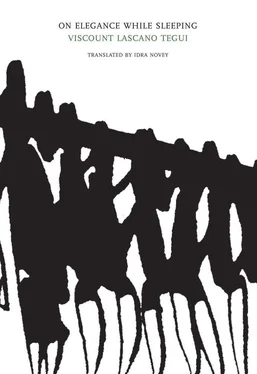Have you heard the creaking of a transatlantic ship, surrounded by the ocean? That was the creaking of the walls of Esther the Jew’s room when our little symposium happened to go on and on, and my pleasure monopolized her all through the night. Have you ever heard people talk about the shadows of the departed passing over the roofs of the houses where they died? Well, we saw the restless silhouettes of the satyrs waiting and waiting in the confines of the brothel. The nightmares that disturbed my sleep in Esther’s room were unending. In my dreams, the troops of the Forty-Sixth Infantry would never forgive me. They couldn’t help it. Their desire was hanging out of their flies, camped along the walls of Alexandria, banging on the walls of Esther’s room until the walls felt as though they would collapse at last and suffocate me…But no, little by little desire realized the uselessness of its efforts and astutely took a different tack. It came up to the door but it couldn’t slide open the shutter-bolt. It doesn’t have hands, you see. It leaned on the door and pushed. The door was elastic. It seemed to give way only to become more rigid thereafter. From my bed, I watched this bloody struggle between cedar of Lebanon and stray desire — and admired the door’s triumph in the end.
Already, the sun was coming in through the cracks of the poorly insulated room and the house eunuch was shaking out the rugs, which now seemed hardened with spit, like the thorny leaves of prickly pears.
APRIL 24, 18—
Have I already mentioned that one of my relatives was myopic and an eye doctor and that he fished with a tall reed, looking through opera glasses? His nearsightedness imposed a necessary punctiliousness to his movements and even intentions. As a result, he was meticulous in all things. I inherited his enormous delight in neatness. Seeing is already a pleasure, but clarity makes it a pleasure twice over. Would that I could use microscope lenses as my spectacles. Winter always enticed me to the windows of my room, to watch the sad lives of our townspeople blanketed in snow, and so, in the months beforehand, I always made certain to prepare my observatory: I cleaned the windowpanes with such care that they seemed almost nonexistent in their translucency. Flies, still unaware of the invention of glass, tried to come in from the street, dying from the impact. I’ve watched them dying, in piles, writhing around uselessly, deliciously, trying in vain to prolong their existence. But winter slaughtered them nonetheless in the ambush of my clear glass. And I, behind this glass, watched them die.
MAY 19, 18—
After two years away, I found myself returning to Bougival with Raimundo the coachman today. He was much older. His hair had grayed dramatically. “The snow of the years”—such an affected, romantic image. Gray mold instead of hair. Not so much conquered by time as by the elements.
Should I have asked about his life? No. It’s easy to read a single newspaper from start to finish, but an entire year’s worth is more likely to make you want to run away…And that’s the impression Raimundo gave. An enormous bundle of newspapers, too imposing to dip into, despite the interesting things one might learn…
“And how have you been?” he asked instead. Next to his life as a coachman-drifter, running to so many volumes, my own adventures would fill only a few measly sentences…“What do you bring us from Africa?”
“Syphilis,” I replied mechanically.
Raimundo didn’t seem the least bit surprised. Perhaps he would have found it far stranger had I returned with nothing at all. I was surprised at my honesty, but how could I consider hiding anything from this most supreme confessor — particularly the interior drama I was then experiencing, the impetus to the greatest art that one can dream of attaining: at once the lion and the Christian in the arena of the soul…?
“And what are you going to do about it?” he asked me sarcastically — the old pachyderm.
“I’m thinking about writing a book,” I said, “a book that would be a sort of symptomatic journal of my disease that could serve as a source of information for doctors and literary types both. This idea came knocking at my door as twilight fell…I let it seduce me as though I were just another conquest…Even though I know that writing a book is the greatest shame that an original mind can bring upon itself.
“But — I want to write a book, Raimundo. A book that will make my illness into an iridescent fantasy…”
“Then there’s only one thing that can be holding you back,” my coachman replied, “and it’s worrying that women won’t want you once they read about your life. But I don’t think that’ll happen in your case. Women love to love degenerates, you know. When you make it public that you’re now what the better wives in town like to refer to oh so poetically as ‘badly indisposed,’ then, only then will you find out what it truly is to be loved! You’ll acquire — oh, conquering hero! — the allure of the dangerous. Till now, the only way to make yourself seem so attractive was to make it known that you’re a libertine with a trail of pregnant, brokenhearted victims in your wake! In future, however, that petty sort of allure will give way to a new form of voluptuousness — the syphilitic! It will be the fourth forbidden form of sensuality to add to your store. You’ve quite exhausted the other three: abortion, menstruation, and the douche…
“But I digress: a symptomatic journal, you say?”
“Yes, yes…already the disease snakes through me…the curling tendrils of love and syphilis — one of absolute purity, the other…how to describe it?”
“Call it the glory of Don Juan!” said Raimundo. “And, look, if you have the courage to give away your secrets in this book, don’t hesitate to make Don Juan your protagonist! Imagine how beautiful it would be…the only thing that’s missing from the story of Don Juan — who’s really nothing more than an artificial phallus, a masturbatory fantasy for Catholic women — is his being syphilitic…”
“I’ll consider it,” I told him, and got down from the coachbox ready to write my first chapter.
JUNE 29, 18—
You’ll never know the true depths of the abyss without first probing the mouth of your own syphilitic chancre. The tiny excavation this silent worker etches into your trusting skin will show you the deep darkness of eternity. Being marked in this way, with a crater on one’s body, a crater that can easily be covered with cotton, is a sign that one has been found worthy of the beauty bestowed by God, who paves some pathways with precious stones and renders others impassable…It’s not my fault I’ve been given such an honor. My son’s nasal septum, which syphilis will erode, will make him look like Socrates: a good subject for future statuary. (Hereditary syphilis, our own wise men say, affects the nasal septum.) That son of an Athenian midwife didn’t leave any written works, after all — he’s known only by his bust. See how the ages have esteemed him. His snub nose was unbreakable — the perfect nose to be sculpted in stone. It lends itself to solidity. What makes for ugliness in life ought to help make one eternal, no? Why bother filling up the libraries with works of genius? All those stone Socratic heads — with no sharp angles, and therefore no structural weaknesses — have stayed intact despite the centuries, despite the iconoclasts, despite rival philosophers. It was enough for Socrates to be syphilitic to be right.
JULY 4, 18—
Look, the type of Don Juan you should put in this book you’re threatening us with — well, maybe you could base him on a particular exemplar of the type, whose confession I used to take, and who, today, in my capacity as coachman, I don’t really mind exposing to public scrutiny…
Читать дальше












